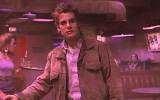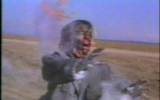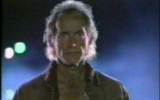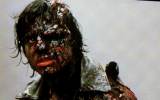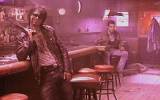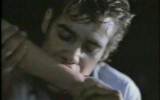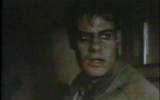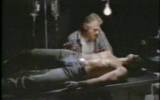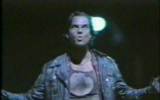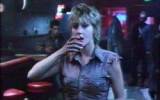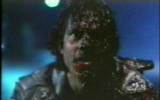
|
Derzeit online |
||
|
386
|
Filme | |
|
125
|
Bücher | |
|
34
|
Biographien | |
|
50
|
Hörspiele | |
|
|
||

![]()
| Near
Dark AKA: Buio si avvicina, Il, Aux frontiéres de laube, Near Dark - Die Nacht hat Ihren Preis
Caleb,
whose metamorphosis into a creature of the night starts directly,
also has to realize this painfully. As his car won't start, he has
to go home on food, and the higher the sun rises, the worse he is
feeling. Just before reaching his father's farm he collapses and
is kidnapped in front of the eyes of his family by a rapidly arriving
camping car with darkened windows. When he regains consciousness, Mae is with him and introduces him to her "family". Jesse and Diamondback, the "father and mother figure" of the vampire clan, the psychopathic Severen and Homer, having the body of a child and being forced to live in this body for eternity (comparable to Claudia in "Interview with the Vampire"). These quite unfriendly people are not very happy to accept Caleb in their group. Nevertheless, Caleb is given one week as probation period and has to learn to kill in order to survive. When
he gave away his last chance, because he had let the victim escape,
he can proof himself worth anyway, when he saves the vampire group
by risking his "life" when the police lays siege to the
motel bungalow of the vampire desperados and the lethal sunburn
is imminent. Now Caleb seems to be integrated and starts to feel
affiliated to this strange new world. But the affection towards
his human family prevails. When he meets his real father and sister
in a motel by chance, he uses the moment and flees. By
means of a blood transfusion Caleb is turned back into an ordinary
human again. But the vampires do not want to accept this defeat
and kidnap his little sister. The bloodsuckers then lose the final
fight - the nights in Oklahoma seem to be shorter than elsewhere
- and the rising sun burns them. Caleb rescues his sister and Mae,
the girl he loves. And thanks to a blood transfusion Mae also becomes
mortal again. Happy End.
To say it first: yes, the end is stupid and way too simple. Furthermore the story lacks logic from time to time. And it's only due these two facts that the movie doesn't receive the best ranking possible (five bats). Apart from these minor flaws, the movie is one of the greatest and most exceptional vampire movie of the 80s, and also in general one of THE movies of the decade (and it will always stay one of our favorite movies - at least Top 10). "Near
Dark" definitely differs from all other vampire movies of the
80s. Just have a look at Joel Schumacher's "The
Lost Boys" from the same year and you will understand what
I mean. Kathryn Bigelow anticipates many of the typical stylistic
means of the cinema of the 90s, creating a kind of basis for movies
such as "Interview with the Vampire"
or "The Addiction". Here it's the first time the tragic
aspects of being a vampire are treated philosophically - which would
become typical for later productions. On the other hand, her portrayal
of explicit violence, the road movie and cowboy-noir themes surely
inspired Rodriguez "From Dusk
till Dawn" and Carpenter's "Vampires"
(who wasn't really able to convert them into a good movie, but that's
another story). It's
only the happy end with Caleb and Mea and the too easy rescue by
means of blood transfusion that limits the pleasure, but I guess
I've already mentioned this before. Up till then Ms Bigelow leads
us through 89 minutes of powerful pictures (and she could only come
up to these once later in "Strange Days" - and here the
end was stupid as well) Concerning the actors I would especially like to praise the performance of Lance Henriksen as mostly levelheaded cool leader of the vampire group and Bill Paxton, whose interpretation of the psychopath is alarmingly realistic. The rest of the ensemble is convincing as well. It's only Jenny Wright as vampire bride Mae who somehow stays pale (hihi), her emotions do not seem very convincing and her acting appears somehow helpless. I
hope you know what to do now! Watch it! It's really worth seeing.
|
|||||||||||||||||||||||||||||||||||||||||||||||
|
|||||||||||||||||||||||||||||||||||||||||||||||

